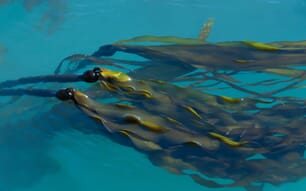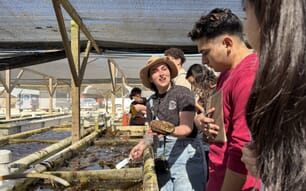
© Tritonia Scientific
Mowi Scotland has released stunning images of marine life around its farm at Loch Hourn. The images were taken by a dive team from Tritonia Scientific, an independent marine surveying consultancy, amongst the site’s moorings and the surrounding areas which have had a fish farming presence for over 30 years.
The images show a number of species present in the loch, including feather stars, peacock worms, kelp, sponges, squirts, hydrozoan, small-spotted catshark, lions mane jellyfish, symbiotic fish, wrasse and female cuckoo wrasse, anemones, starfish with tube feet, urchins and nudibranchs, brown crab, soft coral, scallops and many more.
“At Mowi Scotland, protecting our marine environment is at the heart of everything we do. That is why we commissioned an independent environmental survey of the seabed and waters around our salmon farm at Loch Hourn, a waterbody that has been the subject of a recent environmental pollution report,‘‘ said Stephen MacIntyre, head of environment at Mowi Scotland, in a press release.
Mowi commissioned Tritonia Scientific to undertake this marine survey to reassure people that salmon farming does not cause damage to the marine environment. On the contrary, Atlantic salmon and the wider ecosystem in the loch can flourish side by side.
“There are a lot of misconceptions around the environmental effects of fish farming, with rush to judge and apportion cause and effect when reports such as these arise. In response, it’s important we acknowledge such concerns but that we also investigate, monitor and transparently present observational field data to inform more reasoned opinions,‘‘ added Maclntyre.

© Tritonia Scientific
Mowi responds to environmental concerns
Mowi says it is committed to responsible and sustainable operations that uphold strict environmental standards. The company emphasised that any concerns about its practices are taken seriously and thoroughly investigated.
Following recent claims that its Loch Hourn farm was harming the local environment, Mowi commissioned the independent survey to assess conditions on and around the site. According to the company, the results demonstrate that salmon farming is not damaging the marine ecosystem in the loch – rather, it is coexisting with a rich and diverse array of marine life.
The images – and a video now available online – were shared as visual evidence of this claim, showing the seabed and surrounding waters teeming with marine species. Mowi says this is what responsible fish farming looks like in a well-managed and environmentally conscious setting.
“In Scotland we operate to some of the most stringent regulatory controls for fish farming in the world. This is especially so in respect of environmental protections. We have a team of environmental professionals monitoring our farms and with the recent organisational commitment to fund a dedicated survey we are increasingly going beyond our regulatory requirements which will allow us to continue to share data and evidence on the healthy seas around our farms,‘‘ said Maclntyre.

© Tritonia Scientific



